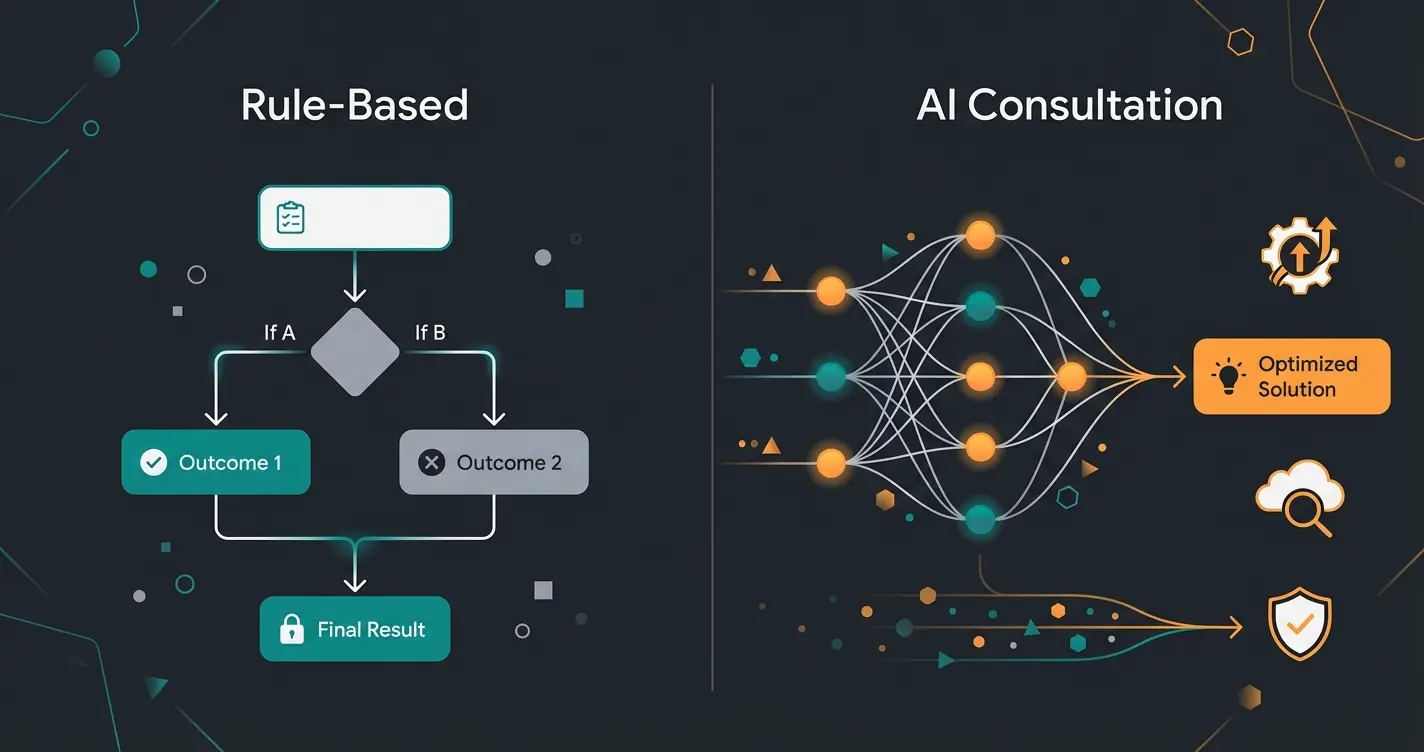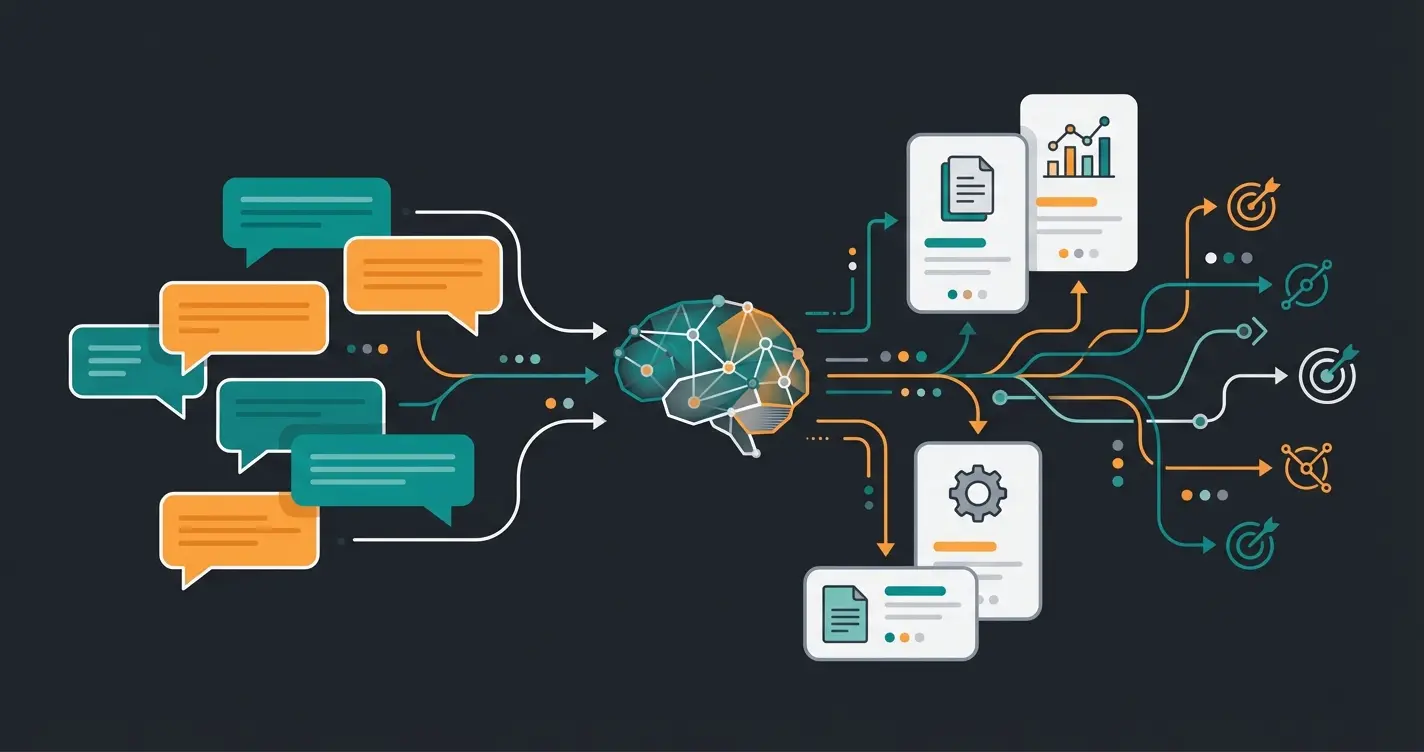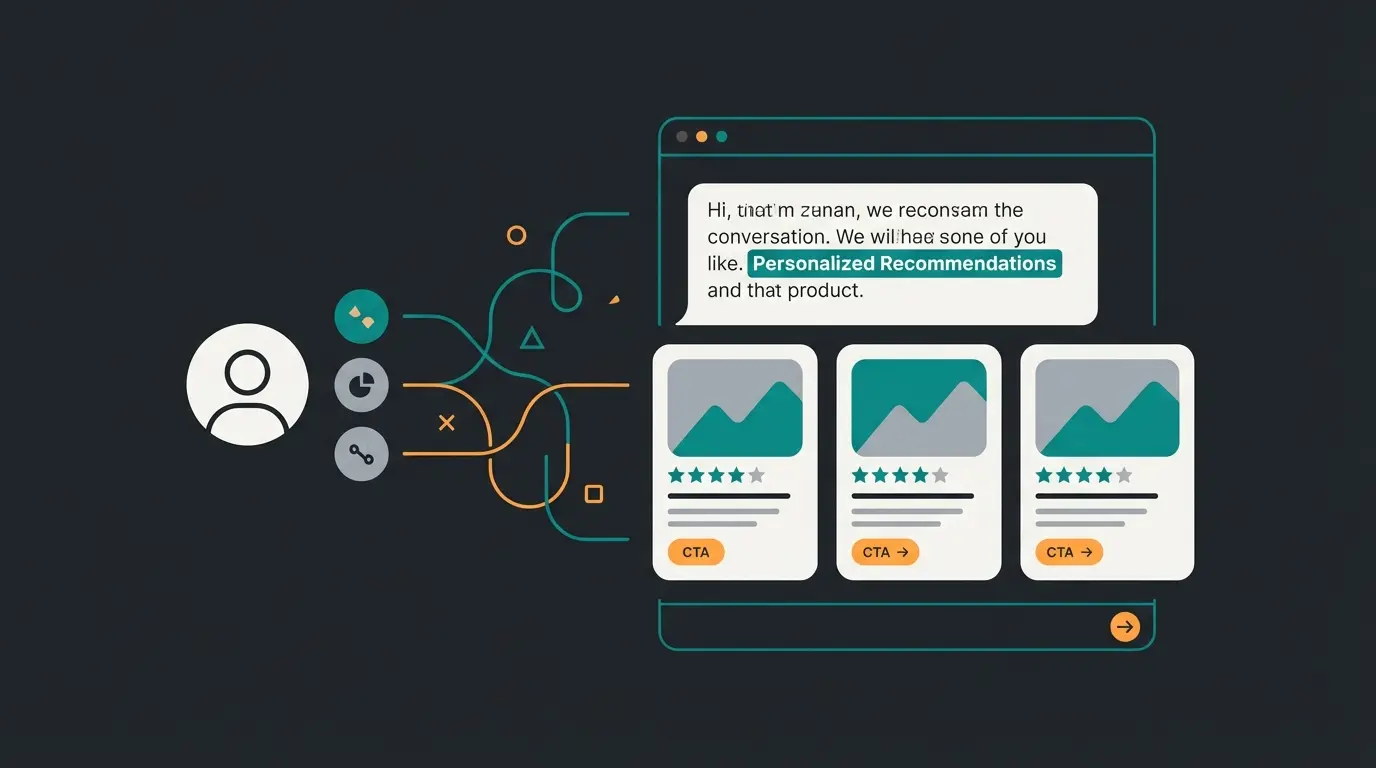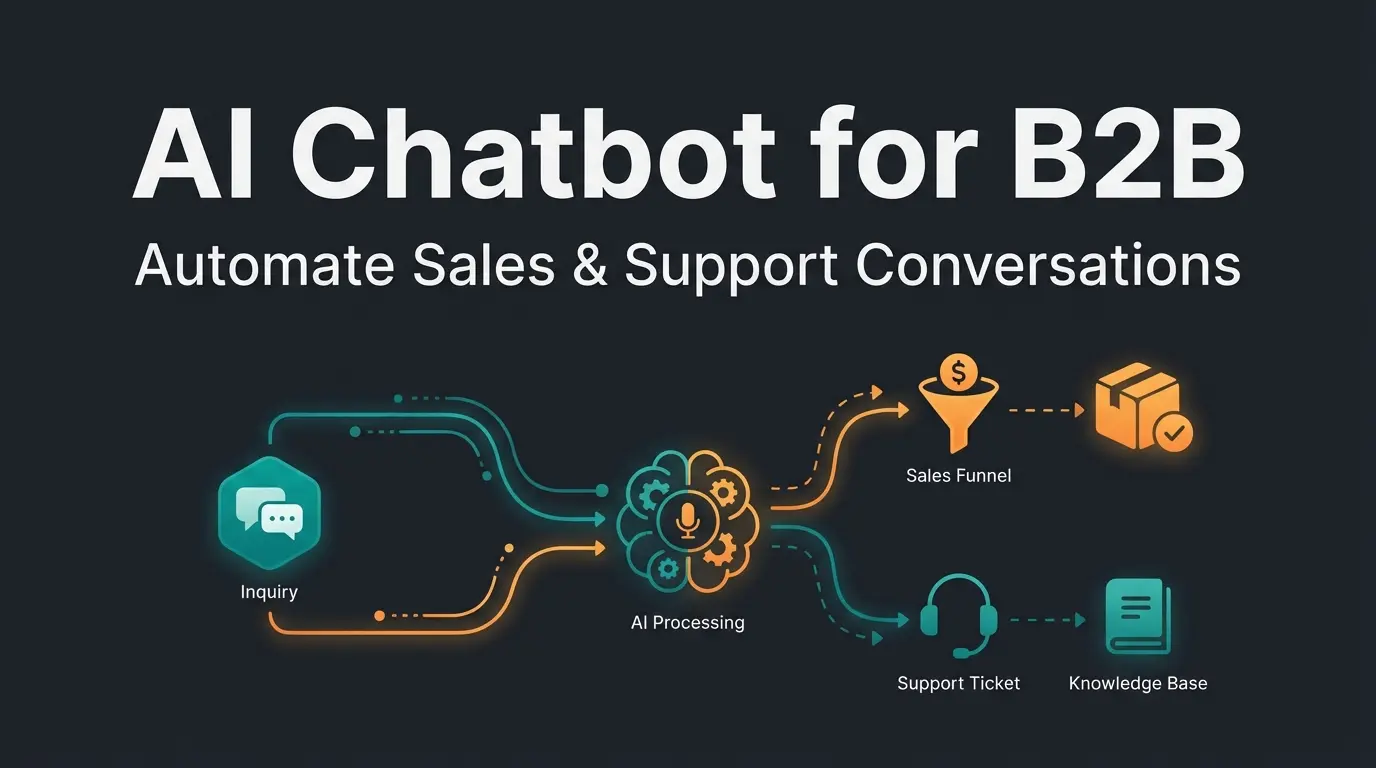The Evolution: From Support Bots to Digital Sales Agents
Most companies use AI chatbots to answer "Where is my package?" Smart companies use them to sell. This fundamental shift in perspective separates businesses that merely automate support from those that transform customer interactions into revenue opportunities.
AI chatbots for FAQ automation are intelligent software programs based on artificial intelligence, developed to automatically answer frequently asked questions. This innovative technology is gaining increasing importance in customer service and is changing the way businesses interact with their customers. However, the most forward-thinking organizations are discovering that the true power of AI chatbots lies not in deflecting support tickets, but in guiding customers toward confident purchase decisions.
The growing importance of AI chatbots in customer service can be attributed to several factors. Customers today expect fast and precise answers around the clock. At the same time, businesses face the challenge of providing efficient and cost-effective support. But here's the critical insight that most miss: while FAQ automation saves money, product consultation makes money. The difference between a cost center and a revenue driver comes down to how you deploy this technology.
For businesses, the use of AI chatbots offers numerous advantages. They can scale their customer service without compromising quality. The automation of routine inquiries relieves human employees, who can then focus on more complex tasks. Customers benefit from faster response times and constant support availability. Yet the real transformation happens when chatbots move beyond reactive support into proactive selling—understanding customer needs and recommending the right products.
Percentage of routine inquiries handled without human intervention
Lift in sales conversion when using consultative AI vs. basic FAQ bots
Support cost savings through intelligent automation
Round-the-clock customer engagement without staffing limitations
Understanding AI Chatbots: Definition and Core Technology
To understand the capabilities of AI chatbots for FAQ automation and product consultation, it's essential to understand how they work. Fundamentally, two types of chatbots can be distinguished: rule-based and AI-powered chatbots.
Rule-based chatbots follow predefined scripts and can only respond to specific, pre-programmed questions. They are limited in their flexibility and adaptability. AI-powered chatbots, on the other hand, use advanced technologies such as machine learning and natural language processing (NLP) to understand and respond to user inputs. This distinction becomes critical when we introduce a new categorization: Support AI versus Consultative AI.
The technical foundations of AI chatbots are based on various components of artificial intelligence. Machine learning enables chatbots to learn from interactions and continuously improve their performance. NLP helps them understand and generate human language. The functionality of AI chatbots can be broken down into several steps. First, the chatbot analyzes the user's input using NLP. Then it identifies the intent behind the request and searches its knowledge database for relevant information. Finally, it generates an appropriate response and outputs it in natural language.
According to IBM research on conversational AI, the components of dialogue-oriented AI include the following elements:
- Machine Learning (ML): Enables continuous improvement through experience
- Natural Language Understanding (NLU): Interprets the meaning behind user inputs
- Automatic Speech Recognition (ASR): Converts spoken language into text
- Natural Language Generation (NLG): Produces human-like responses
These components work together to enable natural and effective communication between humans and machines. Through the use of these advanced technologies, AI chatbots can automate complex FAQ systems while simultaneously providing a personalized and context-aware user experience. But the true differentiator lies in how these technologies are applied—whether for passive question answering or active sales consultation.

FAQ Bot vs. Digital Product Consultant: The Critical Difference
This is where most businesses get it wrong. They implement chatbots thinking about support deflection when they should be thinking about sales enablement. The difference between an FAQ bot and a digital product consultant isn't just technical—it's strategic.
An FAQ bot operates passively. A customer asks "Do you have laptops?" and the bot responds "Yes, we have laptops." End of interaction. A digital product consultant operates proactively. The same question triggers: "Yes! Do you need the laptop primarily for gaming, creative work, or office tasks? Based on your needs, I can recommend the perfect model for your budget." This is the psychology of advice—the consultant bot doesn't just answer, it understands needs and recommends solutions.
| Aspect | FAQ Bot (Support AI) | Product Consultant (Sales AI) |
|---|---|---|
| Primary Focus | Deflecting tickets, answering static questions | Guiding purchase decisions, increasing conversions |
| Interaction Style | Passive, reactive | Proactive, consultative |
| Business Impact | Cost center (saves money) | Revenue driver (makes money) |
| Success Metrics | Ticket deflection rate, response time | Conversion rate, average order value, guided selling rate |
| Technology Integration | Knowledge base, help articles | PIM system, product attributes, inventory data |
| User Experience | "Here's your answer" | "Let me help you find the perfect solution" |
| Customer Outcome | Question answered | Problem solved, purchase confidence gained |
The revenue focus versus cost focus distinction is critical. Traditional chatbot implementations obsess over metrics like "ticket deflection rate" and "cost per interaction." These are support metrics. Smart implementations focus on "guided conversion rate," "average order value increase," and "recommendation acceptance rate." These are sales metrics. The same technology, deployed differently, produces dramatically different business outcomes.
The Consultation Gap: A New Problem to Solve
Here's the uncomfortable truth: FAQ bots often frustrate customers who want to buy. A customer arrives at your website ready to purchase but uncertain about which product fits their needs. Your FAQ bot can tell them your return policy and shipping times, but it can't help them choose between the three product variants that might solve their problem. They leave. This is the consultation gap—and it's costing e-commerce businesses billions in abandoned potential sales.
The psychology of digital advice differs fundamentally from support automation. When customers seek advice, they want to feel understood. They want an interaction that mimics the experience of talking to a knowledgeable salesperson who asks the right questions, listens to their answers, and makes informed recommendations. An FAQ bot that spits out product specifications fails this test. A consultative AI that engages in dialogue passes it.
Benefits of AI Chatbots for Customer Service and Sales
AI chatbots offer numerous advantages for automating frequently asked questions (FAQs) in customer service—but the benefits multiply when you extend their capabilities into sales consultation. These intelligent systems revolutionize how businesses interact with customers and provide information. Here are the key benefits in detail:
Round-the-Clock Availability
AI chatbots are available 24 hours a day, 7 days a week. They enable businesses to provide customer support at any time, regardless of business hours or holidays. This constant availability significantly improves customer satisfaction, as questions can be answered immediately. For sales consultation, this means never missing a purchase opportunity because a customer browsed your site at 2 AM with questions about product specifications.
Instant Response Times
A major advantage of AI chatbots is their ability to answer inquiries within seconds. Unlike human employees who may need to handle multiple requests simultaneously, a chatbot can react immediately to every question. These fast response times contribute to improving the overall customer experience—and in sales contexts, reduce the likelihood of cart abandonment due to unanswered questions.
Consistent Information Delivery
AI chatbots ensure consistent and accurate information delivery. They access a central knowledge database and always provide the same correct answers to recurring questions. This reduces the risk of misinformation or inconsistent responses that can occur with human employees. For product consultation, this means every customer receives accurate specifications, pricing, and availability information.
Unlimited Scalability
Another significant advantage of AI chatbots is their scalability. They can easily handle increasing inquiry volumes without requiring additional resources. Whether a hundred or a thousand simultaneous requests—a well-designed AI chatbot manages this task without quality degradation. During peak sales periods, this scalability becomes a competitive advantage.
Dual Cost-Revenue Impact
Implementing AI chatbots for FAQ automation can lead to significant cost savings. They reduce the need for human personnel for routine inquiries and enable employees to focus on more complex tasks. In the long term, businesses can reduce their operating costs while simultaneously improving the quality of their customer service. But here's the transformation: when the same technology is applied to sales consultation, it doesn't just save money—it generates revenue through increased conversions and higher average order values.
These advantages make AI chatbots a valuable solution for the customer service revolution. They optimize not only internal processes but also significantly improve the customer experience. The next evolution is applying these same benefits to proactive selling.
Stop deflecting tickets. Start closing sales. Discover how consultative AI can turn your customer interactions into revenue opportunities.
See It In ActionHow AI Chatbots Revolutionize Product Consultation
The technical leap from FAQ automation to product consultation requires a fundamentally different approach to AI implementation. It's not just about answering questions—it's about understanding needs, processing complex product data, and delivering personalized recommendations that drive purchase confidence.
Integration with Product Information Management
Unlike FAQ bots that read from a static knowledge base, consultative AI connects directly to your Product Information Management (PIM) system. This integration enables the chatbot to access real-time product attributes, specifications, inventory levels, and pricing. When a customer asks about a hiking boot for winter conditions, the AI doesn't just return a generic product page—it filters your catalog based on waterproof ratings, insulation specifications, and price range to deliver relevant recommendations.
The Human Touch Through AI
Effective product consultation AI mimics the behavior of your best salespeople. It asks clarifying questions: "Do you prefer leather or synthetic materials?" It considers budget constraints: "Based on your price range, here are three excellent options." It handles objections: "I understand waterproofing is your priority—this model uses GORE-TEX technology specifically designed for wet conditions." This conversational flow builds trust and guides customers toward confident decisions.
AI asks targeted questions to understand customer requirements and preferences
System processes responses against product database attributes
AI presents curated options with personalized explanations
System addresses concerns and provides comparison data
Customer receives clear recommendation aligned with their needs
Learning What Customers Actually Want
Here's an underappreciated benefit of consultative AI: data intelligence. FAQ bots tell you what customers complain about. Consultation bots tell you what customers are actually looking for. Every conversation generates insights about product preferences, feature priorities, price sensitivities, and unmet needs. This data feeds directly into product development, inventory planning, and marketing strategy.

Implementation Guide: Deploying AI Chatbots Effectively
The successful introduction of AI chatbots for FAQ automation and product consultation requires careful planning and implementation. Here are the most important steps for effective implementation:
Selecting the Right Chatbot Platform
The first step in implementing an AI chatbot is choosing the right platform. There are various providers and solutions on the market that differ in functionality, integration options, and pricing models. When selecting, businesses should consider the following aspects:
- Scalability: The platform should be able to keep pace with business growth
- Customizability: Options for personalizing the chatbot according to corporate identity
- AI Capabilities: Advanced NLP functions for precise answers and consultation flows
- Analytics Functions: Tools for monitoring and optimizing chatbot performance
- Product Data Integration: Ability to connect to PIM systems and product catalogs
- Consultation Flow Builder: Tools for designing guided selling conversations
Integration into Existing Systems
Seamless integration of the AI chatbot into existing IT infrastructure is crucial for success. This includes connecting to CRM systems, knowledge databases, and other relevant platforms. For consultation AI, this extends to product databases, inventory management, and e-commerce platforms. Good integration enables the chatbot to access all necessary information and thus provide precise and context-related answers—including real-time product availability and pricing.
Training the Chatbot with Relevant Data
Training the AI chatbot is a critical step in the implementation process. The system is provided with relevant data and information so it can give accurate and helpful answers. The training process typically includes:
- Data Preparation: Collection and preparation of FAQ data, customer interactions, and product information
- Model Creation: Development and fine-tuning of the AI model for both support and consultation scenarios
- Conversation Design: Building guided selling flows that mimic top salesperson behavior
- Testing Phase: Extensive testing to ensure accuracy and relevance of answers and recommendations
- Continuous Learning: Regular updating of the model with new data and insights
A successful integration of AI chatbots requires careful planning and execution of these steps. With the right strategy, businesses can benefit from the numerous advantages of FAQ automation while simultaneously building revenue-generating consultation capabilities.
Checklist: What to Look for When Selecting an AI Solution
When evaluating AI chatbot solutions, particularly for product consultation capabilities, consider these critical factors:
- Shop System Integration: Does the platform seamlessly connect with your e-commerce system (Shopify, Magento, Shopware, etc.)?
- Complex Product Attribute Handling: Can it process and reason about technical specifications, variants, and compatibility?
- No-Code Training: Is it easy to train and update without programming knowledge?
- Guided Selling Features: Does it support multi-turn conversations that narrow down recommendations?
- Analytics Dashboard: Can you track conversion impact, not just deflection rates?
- Multilingual Support: Does it handle your target markets' languages with cultural nuance?
- Human Handoff: Is there smooth escalation to sales representatives for high-value opportunities?
Best Practices for AI Chatbots in Customer Service
AI chatbots have proven to be valuable tools for FAQ automation and customer service. To fully exploit the potential of this technology, it's important to follow some best practices. These ensure that AI chatbots work effectively and provide a positive user experience—whether for support or sales consultation.
Transparent Communication of Chatbot Capabilities
Clear communication about the chatbot's capabilities and limitations is crucial. Customers should know from the beginning that they're interacting with an automated system. This helps set realistic expectations and avoid frustration. Inform users about what types of requests the chatbot can handle and when a transfer to human employees occurs. For consultation scenarios, be clear that the AI can help narrow down options but that complex custom requirements may need human expertise.
Seamless Handoff to Human Employees
Although AI chatbots can handle many requests independently, there are situations that require human intervention. An effective handover process is therefore essential. The chatbot should be able to recognize complex or sensitive matters and seamlessly transfer them to a human employee. All relevant information from the previous conversation should be transmitted to avoid repeated input by the customer. For sales scenarios, this handoff can route high-value opportunities to your best sales representatives.
Continuous Knowledge Base Updates
The performance of an AI chatbot depends heavily on the quality and currency of its knowledge base. Regular review and updating of stored information is essential. This includes adding new FAQs, updating product information, and adjusting answers based on customer feedback. Continuous improvement of chatbot interactions contributes significantly to increasing customer satisfaction. For product consultation, this means ensuring new products, discontinued items, and specification changes are reflected immediately.
Personalization of Chatbot Interactions
Personalized interactions significantly increase the effectiveness and acceptance of AI chatbots. By using customer data and context information, the chatbot can provide tailored answers and recommendations. This may include addressing the customer by name, referencing previous interactions, or considering specific customer preferences. Such personalization not only improves the customer experience but also increases the likelihood of successful problem resolution—and in sales contexts, purchase completion.

Challenges and Solutions for AI Chatbots
Despite their numerous advantages, AI chatbots in customer service face some challenges. Understanding these problems and developing appropriate solutions is crucial for the successful use of this technology.
Handling Complex Inquiries
One of the biggest challenges for AI chatbots is handling complex or ambiguous customer inquiries. While they work excellently with standardized FAQs, unusual or multi-layered problems can cause difficulties. For product consultation, this includes scenarios where customers have unique requirements or need to compare products across multiple dimensions. To address this, it's important to continuously train and refine AI models. Additionally, chatbots should be programmed to recognize their limitations and seamlessly hand off to human employees when needed.
Ensuring Data Privacy
Protecting customer data is of paramount importance when using AI chatbots. Chatbots often process sensitive information, raising questions about data security and privacy. To address these concerns, businesses must implement strict data protection policies and transparently communicate how customer data is collected, stored, and used. Compliance with data protection laws such as GDPR is essential. For consultation scenarios involving purchase intent data, additional consideration must be given to how behavioral data is stored and used.
Balance Between Automation and Personal Contact
Another challenge is finding the right balance between automated support and human contact. While AI chatbots offer efficiency and scalability, many customers value personal contact, especially for complex or emotional matters—and often for significant purchase decisions. The solution lies in a hybrid approach where AI chatbots are used for routine inquiries while human employees are available for more demanding situations. This strategy enables businesses to take advantage of automation without losing the human touch in customer service and sales.
According to IBM's study on conversational AI, some of the main challenges include processing voice inputs (especially with different dialects and accents) as well as user concerns about interacting with AI systems. To overcome these challenges, continuous improvement of NLP capabilities as well as open communication with users about the possibilities and limitations of AI technology is required.
Future Outlook: Generative AI and Hyper-Personalization
The future of customer service will be significantly shaped by AI chatbots. With the rapid development of AI technology, new possibilities are opening up to elevate FAQ automation and customer service to a new level—and to transform how businesses sell online.
Advances in AI Technology
AI chatbots are becoming increasingly intelligent and can handle more complex tasks. Future developments include improved context understanding, more precise answers, and even more natural communication. Large language models are enabling consultation experiences that feel genuinely conversational rather than scripted. These advances enable businesses to offer their customers an even more efficient and personalized service—one that adapts to individual customer needs in real-time.
Integration of Voice Input and Output
Another important trend is the integration of voice technologies into AI chatbots. By combining text chat and voice interaction, customers can choose how they want to communicate with the chatbot. This significantly increases accessibility and user-friendliness, especially for people with limited mobility or visual impairments. For product consultation, voice interfaces enable hands-free shopping experiences and more natural dialogue flows.
Multilingual and Cross-Cultural Support
In a globalized world, the ability of AI chatbots to master multiple languages and understand cultural nuances is becoming increasingly important. Future systems will be able to seamlessly switch between languages and make culture-specific adjustments to ensure truly global customer care. For international e-commerce, this means providing native-quality product consultation in every target market without maintaining separate support teams.
Hyper-Personalization Through Behavioral Data
The next frontier is AI that doesn't just respond to what customers say, but anticipates what they need. By analyzing browsing behavior, purchase history, and interaction patterns, consultation AI will proactively offer relevant recommendations before customers even ask. Imagine a chatbot that recognizes a returning customer, remembers their preferences, and opens with: "Welcome back! I noticed you were looking at winter jackets last week. We just got new stock in your size—would you like to see the options?"
These developments will enable businesses to scale their customer service while simultaneously improving the quality of interactions. AI chatbots will not only automate simple FAQs but also handle more complex inquiries while offering a high degree of personalization and efficiency—and increasingly, they'll drive revenue through intelligent selling.
Case Studies: Successful AI Chatbot Implementations
To illustrate the practical application and success of AI chatbots in FAQ automation and product consultation, let's examine two case studies from different industries:
E-Commerce Company: From Support to Sales
A major online retailer implemented an AI chatbot initially to answer frequently asked questions about products, deliveries, and returns. The results were impressive:
- Response Time: Reduction from an average of 15 minutes to under 30 seconds
- Customer Service Efficiency: 70% of inquiries were fully handled by the chatbot
- Customer Satisfaction: Increase of 25% due to faster and more precise answers
But the real transformation came when they extended the chatbot's capabilities to product consultation. By integrating the AI with their product catalog and training it on successful sales conversations, they saw:
- Conversion Rate: 18% increase in visitors who interacted with the consultation bot
- Average Order Value: 12% higher when customers received AI-guided recommendations
- Product Return Rate: 15% decrease due to better product-fit recommendations
The chatbot was continuously updated with new product information and common customer concerns, leading to steady performance improvement across both support and sales metrics.
Telecommunications Provider: Technical Support and Upselling
A telecommunications company deployed an AI chatbot to diagnose technical problems and offer solutions. The implementation brought the following benefits:
- Availability: 24/7 support without wait times
- Problem Resolution: 60% of technical problems were solved without human intervention
- Cost Savings: 35% reduction in support costs
The chatbot could understand complex technical questions and provide step-by-step troubleshooting instructions. When needed, it seamlessly forwarded to human technicians. More importantly, the company discovered that customers who successfully resolved issues via the bot were more receptive to upgrade offers. By adding consultation capabilities for plan upgrades and equipment recommendations, they generated additional revenue that exceeded their cost savings from support automation.
These case studies demonstrate how AI chatbots can revolutionize FAQ automation while simultaneously improving customer service and driving revenue. They show AI's ability to provide fast, precise, and personalized support, leading to higher customer satisfaction, efficiency gains, and measurable sales impact.
From Support Cost Center to Revenue Driver: The Strategic Shift
AI chatbots have evolved into an indispensable technology for FAQ automation and customer service optimization. But the real opportunity lies in repositioning this technology from a cost-saving measure to a revenue-generating asset.
The key advantages of AI chatbots can be summarized as follows:
- Availability: AI chatbots are available around the clock, offering customers immediate support regardless of time or day
- Efficiency: By automating frequently asked questions, AI chatbots relieve the human customer service team, enabling them to focus on more complex tasks
- Consistency: AI chatbots deliver uniform and precise answers, leading to improved customer satisfaction
- Scalability: With increasing inquiry volume, AI chatbots can be easily scaled without requiring additional personnel resources
- Cost Savings: In the long term, businesses can achieve significant cost savings in customer service through the use of AI chatbots
- Revenue Generation: When deployed for product consultation, the same technology actively drives sales through guided selling and personalized recommendations
The implementation of AI chatbots requires careful planning and continuous optimization. Businesses should pay attention to best practices when introducing this technology, such as transparent communication of chatbot capabilities, seamless integration into existing systems, and regular updating of the knowledge base—and increasingly, training the AI on successful sales conversations, not just support interactions.
Despite some challenges, such as handling complex inquiries or data protection concerns, the benefits of AI chatbots for FAQ automation and product consultation clearly outweigh the drawbacks. With advancing AI technology, these systems will become even more powerful and better able to address individual customer requirements in the future.
Businesses that want to leverage the potential of AI chatbots for their customer service and sales should act now. Integrating this technology can lead to a decisive competitive advantage and sustainably increase customer satisfaction while driving measurable revenue growth.
AI chatbots are more than just a technological trend—they represent a fundamental change in how businesses interact with their customers. By combining human expertise with AI-powered automation, businesses can offer customer service that is both efficient and personal—and increasingly, sales consultation that converts browsers into buyers.
The future of customer service and e-commerce lies in the intelligent use of AI technologies like chatbots. Businesses that seize this opportunity will be able to meet rising customer expectations and assert themselves in an increasingly competitive market environment—not just by cutting costs, but by actively growing revenue through every customer interaction.
An FAQ bot operates passively, answering predefined questions from a knowledge base. A consultative AI chatbot operates proactively, asking clarifying questions to understand customer needs and providing personalized product recommendations. FAQ bots focus on deflecting support tickets (cost savings), while consultative AI focuses on guiding purchase decisions (revenue generation).
Consultative AI chatbots integrate with Product Information Management (PIM) systems and e-commerce platforms via APIs. This enables real-time access to product attributes, specifications, pricing, inventory levels, and variants. The AI uses this data to filter and recommend products based on customer requirements expressed during the conversation.
Yes, businesses implementing consultative AI chatbots typically see 15-30% increases in conversion rates. This improvement comes from reducing purchase friction—customers get immediate answers to product questions, receive personalized recommendations, and gain confidence in their buying decisions. The AI essentially replicates the experience of talking to a knowledgeable salesperson.
Move beyond traditional support metrics like ticket deflection rate. For sales-focused chatbots, track guided conversion rate (percentage of chat users who purchase), average order value for assisted purchases, recommendation acceptance rate, and revenue directly attributed to chatbot interactions. These metrics demonstrate ROI beyond cost savings.
Basic FAQ automation can be deployed in 2-4 weeks. Full product consultation capabilities typically require 6-12 weeks, depending on catalog complexity and integration requirements. The timeline includes PIM integration, conversation flow design, AI training on product data and successful sales patterns, testing, and optimization.
Stop leaving revenue on the table with basic FAQ bots. Deploy consultative AI that guides customers to confident purchase decisions—24/7, at scale.
Start Your Free Trial
